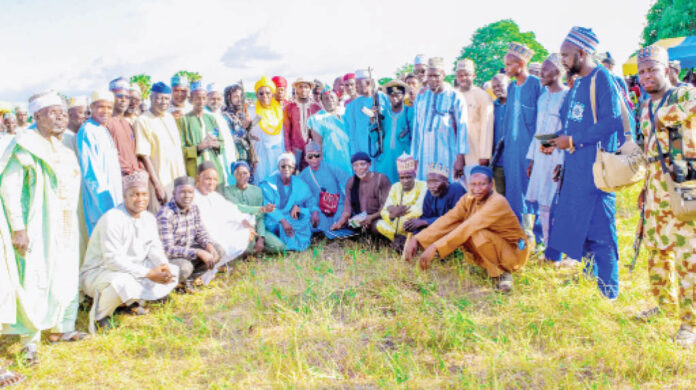In a significant move toward peace and stability, community leaders and bandits in Kurfi Local Government Area of Katsina State signed a peace agreement on Thursday. The accord is aimed at ending years of violence, kidnappings, and cattle rustling that have plagued the region.
The peace deal was brokered by Alhaji Mansur Amadu Kurfi, the Maradin Katsina and district head of Kurfi, alongside Babangida Abdullahi Kurfi, the local government chairman. The signing took place in Wurma forest, a known hotspot for bandit activities and insecurity.
Key bandit leaders, including Alhaji Usman Kachalla Ruga, Sani Muhindinge, Yahaya Sani (also known as Hayyu), and Alhaji Shu’aibu, committed to ending hostilities immediately. They pledged to release all captives in their custody and to allow farmers safe passage back to their lands without fear of attacks.
In response, community leaders promised to collaborate with the bandits in efforts to rehabilitate local schools and hospitals damaged during the years of conflict. They also assured the fair and humane treatment of bandit members who have been detained.
This agreement comes amid ongoing efforts by state and traditional authorities to broker peace between communities and armed groups across northern Nigeria. Katsina State, like many other states in the North West and North Central regions, has suffered from persistent insecurity fueled by banditry, kidnapping, and clashes between farmers and herders.
The peace talks reflect a growing recognition that sustainable peace requires dialogue and cooperation between all parties involved. The involvement of respected traditional rulers such as Alhaji Mansur Amadu Kurfi has been critical in bringing both sides to the negotiating table.
For years, banditry in Kurfi and neighboring areas has disrupted economic activities, especially farming, which is the primary livelihood of many residents. Frequent raids have caused loss of lives, displacement of thousands, and destruction of farmlands and property. The insecurity has also led to school closures and limited access to healthcare.
The bandits’ promise to cease attacks and release captives is seen as a hopeful sign by many residents, who have endured years of fear and uncertainty. Likewise, the community’s pledge to support education and healthcare recovery signals a commitment to rebuilding trust and fostering development.
While the peace agreement is a positive development, experts caution that lasting peace will depend on continued dialogue, effective security measures, and addressing underlying socio-economic issues that drive banditry and violence.
The Katsina State government has expressed optimism that such mediation efforts will pave the way for peace in the state. Authorities have called on residents to support the peace process and cooperate with security agencies.
This latest mediation in Kurfi adds to similar peace efforts across Nigeria’s troubled northwest, where governments, traditional rulers, and community leaders seek to reduce violence through negotiation and community engagement.
For many in Kurfi, the peace deal is a fresh chance to live without fear, return to farming, send children back to school, and rebuild communities torn apart by years of conflict.
The road ahead may be challenging, but this agreement marks an important step towards restoring peace and stability in one of Nigeria’s most affected regions. It also highlights the vital role of local leaders and dialogue in resolving complex security challenges.

